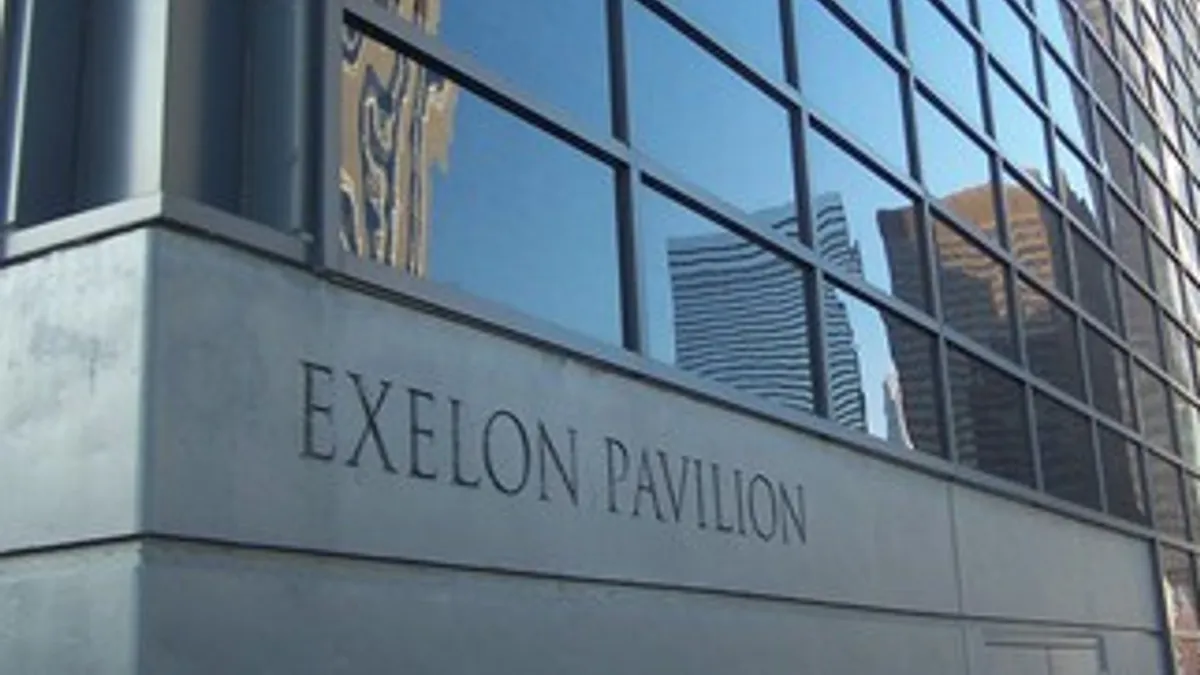Dive Brief:
- The District of Columbia Public Service Commission (PSC) on Wednesday voted to consider a settlement agreement on the proposed acquisition of Pepco Holdings by Exelon Corp., breathing new life into the merger porposal that could create the nation's largest electric utility.
- The PSC rejected an initial merger bid in August, prompting Exelon to enter into negotiations with the office of D.C. Mayor Muriel Bowser and multiple stakeholders to craft a deal they could support. That settlement was first reported by Utility Dive early this month, and Exelon filed with regulators for a reconsideration of their merger proposal soon after.
- The PSC's decision, the Washington Post notes, allows Exelon to add the enhanced merger commitments negotiated in the settlement to its current regulatory proposal, rather than starting from the beginning. That timeline was critical for Exelon, whose CEO threatened to walk away from the deal earlier this week if the process took more than five months.
- Update: A letter to regulators obtained by Utility Dive on Wednesday revealed that 7 of the 13 members of the D.C. Council support the merger settlement.
Dive Insight:
The PSC's decision means public hearings on the enhanced merger proposal will begin in the first week of December — a blow to merger opponents who hoped the PSC would at least make Exelon begin the merger proposal process from the beginning.
"The residents and small businesses of DC are disappointed with the Public Service Commission's decision to expedite the review of Exelon’s bid to buy Pepco," Power DC, a coalition of merger opponents in the nation's capital, wrote in a release. "Exelon’s latest settlement offer still does not address the fundamental conflicts of interest identified by the PSC when it rejected the merger in August."
- A $25 million fund to offset future rate increases for residential ratepayers until 2019
- A fund to distribute a one-time ~$50 credit to D.C. residential ratepayers
- A $15 million fund to support low income residents through a home energy assistance program
- A commitment by Exelon to buy 100 MW of wind power and 10 MW of solar
Critics say the new financial and resource commitments do not alone address the PSC's concern about the "inherent conflict of interest" between Exelon's generation-heavy business model and the District's clean energy goals.
In their rejection of the initial merger proposal, regulators took particular issue with Exelon's large generation business, which includes nation's biggest nuclear fleet. District law, commissioners pointed out in their decision, "requires the electric company to be focused on distribution only."
Exelon has said throughout the merger process that ring fencing provisions in the merger proposal will protect District ratepayers from the financial risks of its struggling nuclear fleet and ensure that it does not favor centralized generation over distributed power resources. When the settlement deal was announced, the D.C. consumer advocate assured Utility Dive that those provisions had been strengthened from the initial proposal.
Critics like Councilmember Mary Cheh (D-Ward 3) aren't buying it. They believe the provisions in the settlement aren't enough to protect District ratepayers.
“There are some provisions there about keeping separate books," she said, "but all I can tell you is that anybody who’s ever heard of the term creative bookkeeping or creative accounting knows there are different ways of accounting costs.”
After its initial rejection, Exelon launched a public relations campaign in the District, recruiting popular former mayor Anthony Williams to publicly call for Bowser, his former mentee, to support the merger.
The stakes in the merger proceeding are high for Exelon. The predictable income of Pepco's utility business could help hedge against risks from a generation portfolio that includes many older nuclear plants running on the verge of unprofitability in PJM markets.
Last year, Crain's reported that Exelon CEO Chris Crane told analysts the company could finance its entire dividend for shareholders with its regulated businesses if the Pepco merger were approved — no small benefit for a company that cut its dividend by 41% the year before. Crane has been impatient lately, telling Crain's that Exelon would walk from the deal if D.C. regulators didn't expedite the process.
D.C. Public Power (DCPP) folded another wrinkle into the merger saga last week when it filed with regulators to acquire Pepco's assets in the city and form a publicly-owned utility. Regulators have yet to weigh in on that proposal.













